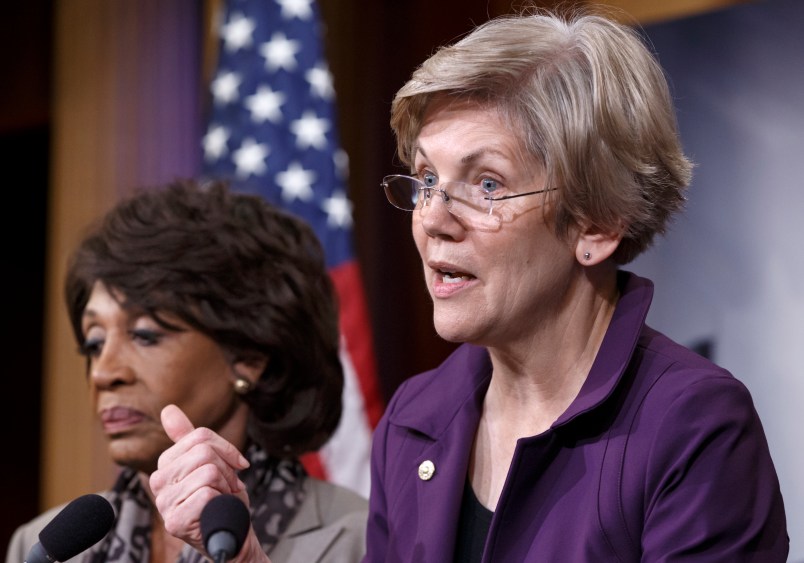There’s an ongoing question centered on the possibility that Sen. Elizabeth Warren (D-MA) might run for president in 2016: how would Hillary Clinton (who looks all but certain to run) respond to Warren’s push to make the economy a signature Democratic issue?
At a Christian Science Monitor breakfast on Thursday Democratic-leaning pollster Celinda Lake and Republican-leaning pollster Ed Goeas unveiled results of a new George Washington University battleground poll which said that 77 percent of those surveyed are worried about current economic conditions. The poll found that 31 percent said the economy is getting worse, 25 percent said the economy is in bad shape and not changing. But just 11 percent said the economy is in a good condition and 30 percent said the economy is getting better.
The problem for Democrats, Lake said, is that they haven’t been able to articulate a broad economic message for improving the economy. Calls for raising the minimum wage, Lake said, are good but not big enough.
Hillary Clinton will have to craft an economic message in 2016 and to do that it’s hard to imagine her completely ignoring Warren, even if she’s not running for president, given that liberals are increasingly siding with Warren’s critiques of Wall Street and using that as a springboard for her to challenge Clinton in the 2016 Democratic primary. Liberal groups have recently begun fully embracing a potential Warren 2016 run and on Wednesday Democracy for America announced that it would invest $250,000 in the campaign to draft Warren. So how will Clinton respond to that?
After all, Warren has recently been on an all-out-crusade in the name of Wall Street reform: urging Democrats to oppose a crucial spending bill to keep the government open until a provision rolling back Dodd-Frank is taken out, opposing an Obama administration nominee for a key position at the Treasury Department, and railing against CitiGroup in speech after speech.
“I don’t see any reason that Hillary won’t be able to get Elizabeth Warren Democrats,” Lake said. “What Elizabeth Warren did was really set an agenda around Wall Street and if you read Elizabeth Warren’s biography, one of the more interesting small passages in there is she talks about how she and Hillary Clinton went together to the White House to lobby for the Consumer Financial Protection Bureau and that actually Hillary convinced Bill [Clinton] to be supportive of it.”
Reporters at the Monitor breakfast pressed Lake on this. How can Clinton really win over Warren supporters who love the Massachusetts senator’s ant-Wall Street message when Clinton is delivering speeches at Goldman Sachs events?
“I mean Hillary Clinton and Bill Clinton present together an economic vision and people think overwhelmingly the Bill Clinton years were much better economically,” Lake said. “People think of Bill Clinton as the comeback kid. They know him better than they know her. So they know that he has that influence. They also have the perception that she came from a middle class family, though they don’t know it that well.”
Lake then pivoted to the fact that conservative columnist George Will has said that fighting the CFPB should be a top priority.
“George Will said the number one fight that we’re going to have is the Consumer Financial Protection Bureau. In his top ten list he said that’s the number one thing that we should take down,” Lake said. “Okay, Elizabeth Warren and Hillary Clinton are very strong on keeping the Consumer Financial Protection Bureau. So when you actually talk about implementing these policies, tax fairness, ending job credits for jobs going overseas and investing that money here at home I don’t think you’re going to find any problem with Hillary Clinton articulating —and you know frankly Bill Clinton articulated a pretty populist economic message in 1992.”









